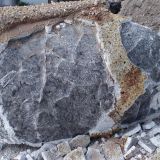Excellent Thermal Shock Resistance For National Defense Cristobalite Powder
Negotiable /Gram
Min.Order:1 Gram
Quick Details View All >
Lianyungang Haosen Mineral Products Co.,Ltd.
For Building Interior And Exterior Wall Coating Density 2.45 Cristobalite Powder
Forplastic, Rubber Hydrophilic And Oleophobic Surface Cristobalite Powder
Good Thermal Shock Resistance For Electronic Chip Polishing Cristobalite Powder
Reduce Recipe Cost For Road Reflective Coating Cristobalite Powder
Product Details
Application:
It is used in jewelry casting, precision casting, dental materials, electronic chip polishing, polishing materials, building interior and exterior wall coatings, road reflective coatings, automotive primers, plastics, rubber, silicone rubber, adhesives, national defense and other fields.
Product Introduction:
Cristobalite powder is made of selected vein quartz ore calcined at about 1500 ℃, processed by non-polluting grinding, magnetic separation and classification.
The properties are stable, the silicon content is over 99.8%, the crystalline phase is tetragonal, the hardness is about 6.5, the density is 2.45, large specific surface, high porosity, good weather resistance, good precipitation resistance, good thermal shock resistance .
Main Features:
1. Excellent optical properties. The refractive index of cristobalite decreases from 1.55 to 1.48, which is closer to that of PE, PP and some resins. The blended resin is transparent and does not cover the color of the pigment itself, while filling with other fillers will make the color of the pigment lighter and distorted.
2. High reflectivity. The concrete structure of cristobalite can help light reflection and replace glass beads as reflective paint. It can not only enhance the anti-skid property, but also improve the reflectivity of paint.
3. High whiteness, low density and bright color. The whiteness of cristobalite is over 95%. It can replace part of titanium dioxide and reduce the cost of formulation when used in coatings and paints.
4. Corrosion resistance, scratch resistance and scrubbing resistance.
5. It does not contain organic pollution and has very low metal content. It can enhance the UV resistance of the coating and has good insulation.
6. Excellent thermal shock resistance. When quartz is heated at 220 - 240 C, a certain degree of thermal expansion occurs, which compensates for the shrinkage of epoxy resin and gypsum during curing reaction at this temperature, so that the casting body does not deform.
7. Application of cristobalite in adhesives
It has low oil absorption value, basically no edges and corners, low viscosity relative to white carbon black, stronger weathering property than white carbon black (white carbon black is alkaline), good bonding effect ( rough surface), good peel strength, high pull-out strength and high surface resistance. After modification, it can be better combined with epoxy resin system to eliminate bubbles and settlement.
A suitable proportion of diatomite can be added to the formulation so as to better improve the adhesion. The silicon powder has many joint surfaces, obvious edges and corners, and difficult to bond. Kaolin is hexagonal flake, red after burning, and has many joints (not easy to bond).
8. Modified quartz powder is usually used as an anti-caking material for transparent PP and PE, LDPE, LLPDE. In film production, because quartz has the same refractive index, for most polyolefin films, this additive has little effect on the optical properties of films. Other special applications include ultrathin films and double extrusion films, which require ultrafine quartz powders. 600 mesh quartz powder is usually used as IR absorption material in greenhouse film.
9. Cristobalite powder has high surface energy, hydrophilic and oleophobic surface, easy agglomeration. It is difficult to disperse evenly in non-polar or weakly polar paints. Therefore, it is necessary to modify the surface of ultrafine powder so that the surface of quartz particles can be coated with a layer of organic substances (such as coupling agents, surfactants, etc.) to make it oleophobic and hydrophilic to oleophilic and hydrophobic. This not only enhances the compatibility and binding force between quartz powder and matrix/substrate, but also enhances the dispersion of quartz.
Contact Supplier

You May Like



New Products
Popular Searches
Recommended Products
Find Similar Products By Category